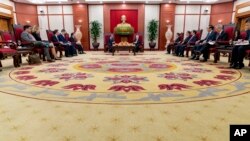An unsettling mix of economic and strategic pressures is seen as pushing Vietnam toward a historic upgrade in relations with the United States, part of a broader realignment that is expected to include closer ties with several U.S. allies in Asia.
U.S. President Joe Biden will arrive in Hanoi on Sunday for talks with Vietnam’s top leaders on ways to deepen bilateral ties, the White House announced last week.
The visit comes at the invitation of Nguyen Phu Trong, secretary general of the Communist Party of Vietnam, following a telephone conversation between the two leaders in late March.
When in Hanoi, Biden is likely to elevate relations with Vietnam to “comprehensive strategic partnership,” a two-notch leap from the existing framework of strategic partnership, Reuters reported this week.
While no formal announcement has yet been made, that would put Washington on par with Beijing and Moscow on Hanoi’s hierarchy of diplomatic ties.
Only a handful of other countries — such as India and South Korea — currently share such a relationship with Vietnam. But Hanoi is reported to be planning to admit Australia, Singapore and Indonesia into this club.
‘Strategic autonomy’
The elevation of U.S.-Vietnam ties to a comprehensive strategic partnership would be a “major development,” Greg Poling at the Washington-based Center for Strategic and International Studies’ Southeast Asia Program told VOA, noting that it would signal “greater strategic alignment between the two countries.”
“Vietnam has made that decision because it views China as a strategic threat and sees closer ties with the U.S. and other like-minded partners as necessary to maintain its strategic autonomy in the face of that threat,” he wrote in an email to VOA.
At a reelection campaign event in Freeport, Maine, in late July, Biden said he “got a call from the head of Vietnam” who “desperately” wants to meet him and to “elevate us to a major partner, along with Russia and China.”
Poling said the decision “sends a message throughout the Vietnamese government that the senior leadership has deemed closer economic, military, and people-to-people ties with the U.S. a top priority.”
Struggling economy
According to a White House press release late last month, Biden and the Vietnamese leaders will “explore opportunities to promote the growth of a technology-focused and innovation-driven Vietnamese economy and increase peace, prosperity, and stability in the region,” among other things.
“Expanding trade and investment with the U.S. will help Vietnam overcome the current economic headwinds,” said Vo Tri Thanh, former deputy head of the Hanoi-based Central Institute for Economic Management.
The growth of Vietnam’s export-driven economy has slowed to 4.14% — the slowest for any second quarter since 2011, and well below the government’s target of 6.5% — due to sluggish demand in the U.S. and EU markets, leading to massive layoffs of blue-collar workers.
Thanh noted that the U.S. is a “key trade and investment partner” of Vietnam. The U.S. is currently Vietnam’s second-largest trading partner behind China and its largest export market, with bilateral trade in 2022 valued at almost $139 billion.
In the first half of this year, the U.S. is the eighth biggest investor in Vietnam, with total capital registered at $405 million.
“Vietnam’s economy is at a turning point of development and reform. In recent years, it has shifted focus from available resources like cheap labor, land and natural resources to productivity, innovation and cutting-edge technologies,” Thanh noted.
He said Vietnam is transitioning to a digital and green economy. It is also seeking to integrate more deeply into a resilient supply chain. These are areas where Washington can help, he added.
‘Imperative’
Hanoi’s decision to upgrade ties with the U.S. followed intense debate within the Communist Party’s Politburo, said Nguyen Huu Vinh, a former security major with links inside the party who is also known as blogger Ba Sam.
He told VOA from Hanoi that the top decision-making body reached consensus consensus on upgrading the ties, but “was divided over which level to upgrade to.” Initial reports on Biden’s visit put the upgrade at “strategic partnership,” a step below comprehensive strategic partnership in diplomatic parlance.
Vietnamese leaders “are facing international challenges” including Russia’s war in Ukraine, China’s economic slowdown and Beijing’s stepped-up harassment in the South China Sea, Vinh added. That has created “an urge for [a] definitive move regarding ties with Washington.”
“From the perspective of national interest, it’s imperative to improve ties with the U.S.,” he said, noting that Washington can help Hanoi on both the economic and political fronts. This can include the transition to new technologies, political support in the South China Sea dispute and weapons sales.
Russia is by far Vietnam’s top supplier of weapons, but given its struggles in Ukraine, the blogger said Hanoi must slowly transition away from Russian weapons.
The upgrade of ties with the U.S. and countries such as South Korea, Australia and Singapore, are signals that Vietnamese leaders “are slowly gravitating toward the West,” Vinh said.
At the same time, he said, Hanoi is not afraid of a backlash from Beijing, because the Chinese “know the Vietnamese leadership well” and are confident that Hanoi “will never fall into Washington’s orbit.”
Just days ahead of Biden’s arrival in Hanoi, Trong received Liu Jianchao, head of the International Liaison Department of the Central Committee of the Chinese Communist Party.
Reuters also reported that Chinese President Xi Jinping or Premier Li Qiang could meet Vietnamese leaders “after or even shortly before Biden's arrival.”
For Washington, the elevation of ties with Hanoi “is a top priority because Vietnam is a vital economic partner in the region and an important non-aligned state in the Global South. And that is where the competition between the U.S. and China will play out,” said Poling from CSIS.
VOA has contacted the Vietnamese Embassy in Washington to inquire about what Vietnam can expect from the U.S. under the new framework but has not received a response.




